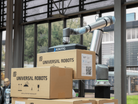The Rise of Cobots, Industry 5.0 & Manufacturers' Wellbeing

Universal Robots is the world’s largest cobot company, headquartered in Odense, Denmark. Its ambition is to create a world where people work with robots, not like robots.
Cobots are lightweight robotic arms that can automate the so-called dull, difficult and dangerous tasks that usually require the skills and manpower of human workers. They are designed to work alongside humans, can be utilised by businesses of all sizes, and in a wide variety of applications including palletising, machine tending and welding.
Mark Gray is the UK & Ireland Country Manager at Universal Robots and he’s responsible for helping businesses of all sizes in the region tackle their most pressing industry issues with cobot automation.
“You can often find my team and I hitting the road on our Collaborate Roadshow events, which take place across various towns and cities in the UK and Ireland,” he said. “As part of these, we showcase our cobots to local businesses and demonstrate how we can help solve important manufacturing challenges.”
Gray’s journey to the robotics industry was shaped by over 25 years of experience in sales and electrical engineering.
"Having this background has equipped me with an in-depth knowledge of the pain points faced by manufacturers as well as the technical pitfalls. When the opportunity to join Universal Robots presented itself over seven years ago, I thought it was perfect for my skill set. It gave me the chance to merge my past experiences while being at the forefront of business innovation.”
Cobots can support manufacturers safety and wellbeing
Due to the nature of the industry, manufacturing workers often carry out monotonous tasks. For example, palletisation – the process of stacking, loading and securing goods onto pallets – traditionally requires strenuous and repetitive manual labour. Over time, this can cause issues for employees such as musculoskeletal damage, as well as mental fatigue. This is where cobots come in.
“Cobots can work alongside humans to take on this work, preventing staff injuries while improving manufacturing quality as human error is reduced,” Gray explains. “In fact, we believe that around two-thirds of the repetitive, manual tasks carried out on the shop floor can be automated using cobots.”
“Manufacturers that implement cobots on the shop floor will see not only an increase in productivity, but be able to ensure worker safety and wellbeing.”
In recent years, businesses have faced heightened uncertainty. Consumer behaviour is now becoming increasingly harder to predict due to external factors, such as the ongoing cost of living crisis and rising inflation.
“We’re likely to see the forthcoming manufacturing revolution focused on navigating these challenges by implementing operations that embrace adaptability,” said Gray. “Cobots could be the solution. They provide the flexibility to adapt to whatever conditions manufacturers find themselves in, whether production must be scaled up or down, or an expansion into new markets is required.”
If required, cobots can be easily reprogrammed to perform different tasks and can switch between these with ease. By eliminating potential pain points between different functions, cobots can slash factory downtime, improving productivity across the board.
“With less human labour required to man machinery, the potential of lights-out 24/7 factories can be realised, boosting factory output like never seen before while providing a better work-life balance for employees.”
Automation innovation can retain manufacturing workers
The manufacturing sector is facing a huge labour shortage right now, with around 74,000 unfilled vacancies. Gray knows that creating a stable pipeline of new talent in the industry will be crucial to the future of many businesses. However, young people often turn away from manufacturing, due to the nature of the work being monotonous and unfulfilling. With cobots able to take over undesirable tasks, employees can focus on more valuable work, such as robotic engineering or coding.
“This shift not only enhances job satisfaction, but it also showcases the evolving and exciting career opportunities within the industry,” said Gray.
As employees move towards more rewarding and valuable work, job satisfaction and staff retention will naturally improve.
“In theory, automating menial factory tasks could also reduce time spent at work and even get rid of the night shift which is known to have adverse effects on employee health. This could allow for more flexible work patterns which not only drive employee retention but also improve productivity – a win-win situation!”
With the enduring volatility of the economy and the manufacturing sector facing its worst performance since the 1980s, many businesses will be looking for ways to improve efficiency and productivity in 2024.
“In the new year, we’ll be on the road again to meet more businesses.”
Gray and his team want to reach as many manufacturers as possible, to ensure they can be better equipped to handle these difficult conditions by reaping the benefits of collaborative automation.
******
Make sure you check out the latest edition of Manufacturing Digital and also sign up to our global conference series - Procurement & Supply Chain 2024 & Sustainability LIVE 2024
******
Manufacturing Digital is a BizClik brand



